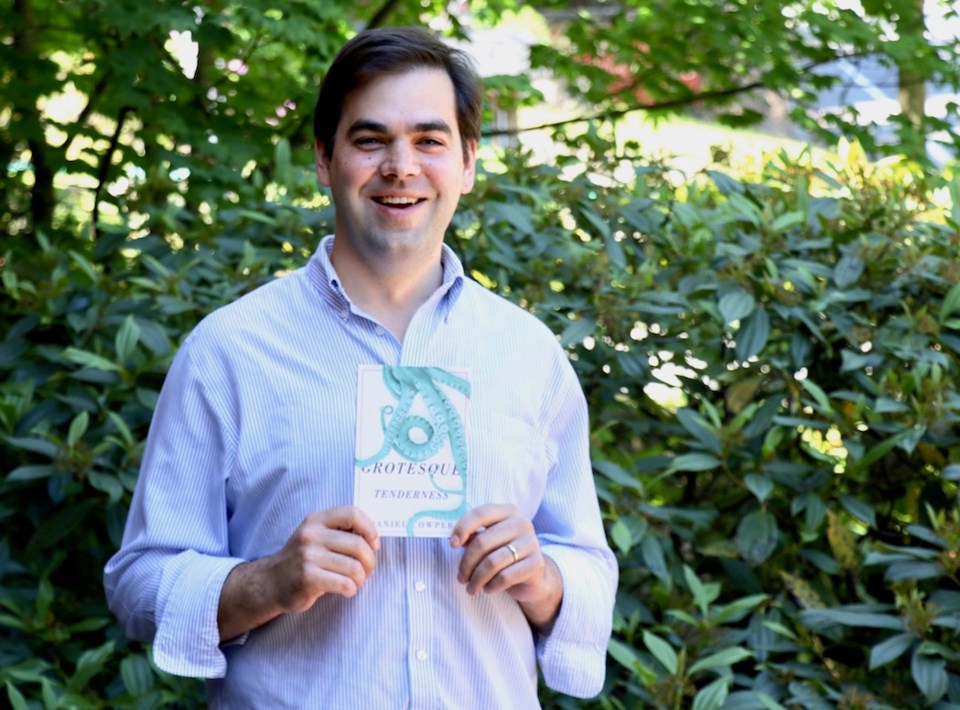Islander Daniel Cowper has had an exciting spring. On top of the birth of his son, he published his first major collection of poems, Tender Grotesqueness. (He published the smaller chapbook The God of Doorsin 2017).
Cowper grew up on Bowen in a cabin his grandparents built. He studied medieval literature at UBC and then got a master of philosophy at New York University and then a law degree in Toronto. He started building a cabin on Bowen in 2007 and moved back to the island in 2010.
Today, Cowper is a lawyer and an editor at Pulp Literaturemagazine.
“This book has things from all of those different stages,” he said.
“The collection’s centre of gravity is a mixture of guilt and grief,” said Cowper. “I feel strongly that there we are all flawed, and that our flaws are both redeemed and heightened when we struggle or suffer.”
The five-part, 127-page, collection covers a lot of ground.
It begins with a series of poems based on the Roman myth of Sextus Tarquinius (known for the rape of Lucretia) and retold in the framework of famed director Roman Polanski’s biography.
“It’s dark and it’s unpleasant,” said Cowper. “But the poems try to make it human at the same time.
“It’s a story about somebody [Polanski] whose mother was gassed by the Nazis, and then who became rich and famous, and then had his wife and his unborn child murdered by the Manson family, and then who became who became a rapist and a sexual predator, and then who subsequently became a good family man.
“It’s a bizarre and grotesque story.”
Cowper said that the title of the book in many ways stemmed from that first collection but also from some of his more personal pieces.
He said that the fifth sequence of poems, “The Salt Worlds” is about a difficult and unhappy time in his life.
“I think when you are very unhappy, you tend to feel that grotesque side of yourself more. So it’s something that you kind of live with more intimately than when you’re happy,” he said. “When you’re happy, you have more of a sense of the beauty of the world and the beauty of your own being. And then when you’re unhappy, you see more of the other side. So the title is an attempt to capture or at least express in some way that those two sides of the same thing.”
The second and fourth parts (“Regrets” and “Windfishing”) are mostly personal poems. The third section is a quasi-mythology of the West Coast.
“The West Coast doesn’t really have a mythology which crosses the line between history and pre-history,” said Cowper.
“That sequence tries to tell a kind of origin story from the Garden of Eden as it were, to a modern world.”
Many of the personal poems were written about Bowen or while missing Bowen said Cowper. “Searle’s Chinese Room Problem” in the fourth section even combines Cowper’s philosophy background with a walk around Killarney lake (John Searle wrote the famous paper, “Minds, Brains and Programs” in 1980 about the Chinese room argument).
“Like the rest of this part of the world, Bowen is a powerfully beautiful place to live. We who live here are shaped by our experience of that present beauty, but we are also shaped by the forces embedded in our education, the arts and cultures of Europe and Asia,” said Cowper. “Many of the poems in Grotesque Tendernessexplore that tension and I hope they do so in a way that achieves a kind of beauty that will especially resonate with other Bowen Islanders.”
“I think if you read [the book] beginning to end, it would make sense,” said Cowper. “I think there’s a kind of coherent theme of sort of awkward desire for connection, belonging, and attempt to make sense out of unhappiness, and an attempt to make sense out of things that don’t necessarily make sense.”
Grotesque Tenderness is published by McGill-Queens University Press and is part of the Hugh MacLennan Poetry Series. Cowper and his wife Emily Osborne along with local poets Susan Alexander and Michael Penny are holding a poetry reading-book launch June 16 at Cates Hill Chapel at 3 p.m.



